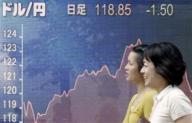Global financial markets stabilize after tremble
 Global financial markets stabilized on Friday after robust corporate results soothed credit fears which have triggered a broad and volatile sell-off in stocks and other risky assets.
Global financial markets stabilized on Friday after robust corporate results soothed credit fears which have triggered a broad and volatile sell-off in stocks and other risky assets.
Earlier, world stocks hit a 6-week low while credit spreads and emerging sovereign bond spreads burst wider as fears grew that a U.S. housing fallout might trigger a global credit crunch.
But European shares have since erased losses as auto shares rallied following strong Volkswagen results. U.S. stock futures pointed to a firmer open on Wall Street after it suffered the biggest fall since February.
European credit markets also improved while government bonds, which earlier drew safe-haven flows, pared gains.
"It seems that the credit fear trade has eased a touch this morning," said David Keeble, head of fixed income strategy at Calyon.
The FTSEurofirst 300 index was up 0.1 percent, having fallen 1 percent earlier. MSCI main world equity index was down 0.8 percent, off its earlier low.
The iTraxx Crossover index, a widely watched indicator for European credit market sentiment, tightened 9 basis points after widening to 445 bps earlier. Emerging market sovereign bond spreads tightened 4 basis points.
The yen fell 0.6 percent against the dollar as hectic buying of the low-yielding currency, long under pressure as a funding vehicle for risky carry trades, eased.
"It's a two-way business. Some might be closing down their carry trades, while others see this as an opportunity to go in at very attractive levels," said Niels Christensen, FX strategist at Nordea.
CREDIT CLOUD
Confusion over the future of a funding deal for private equity firm KKR to buy Alliance Boots added to investor fears that troubles in U.S. high-risk subprime mortgages were no longer a ring-fenced problem.
Deteriorating liquidity in the credit market is raising financing costs for firms, threatening to dry up the stream of M&A deals which have driven stocks this year. Some hedge funds or banks who had exposure to subprimes have also been hit.
"If sustained, the recent sharp rise in the cost of credit will bring to a halt the financing of takeovers or even new investment. It could also substantially impair equity valuations," UBS said in a note to clients.
Reflecting those fears, the iTraxx Crossover index, a key gauge of European credit market sentiment, widened to 445 bps earlier. Emerging market sovereign bond spreads also widened.
Jim Reid, credit strategist at Deutsche Bank, said Thursday's 40 bps widening of the iTraxx was on a scale comparable to the events of the 1998 Russian debt default and Long-Term Capital Management hedge fund crisis.
A sustained rise in the cost of capital will dampen corporate activity and weigh on the otherwise robust global economy, which in turn could discourage central banks from raising interest rates.
Investors are scaling back expectations that the European Central Bank will raise interest rates twice more this year. December Euribor futures now show barely a 10 percent chance for the ECB hiking to 4.5 percent.
London Brent crude was up 0.5 percent in volatile trade as investors focused on tightening fuel supplies and brushed off immediate worries over corporate borrowing costs.
(Published by Reuters, July 27, 2007)